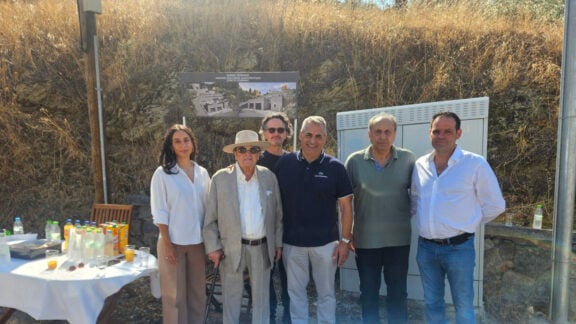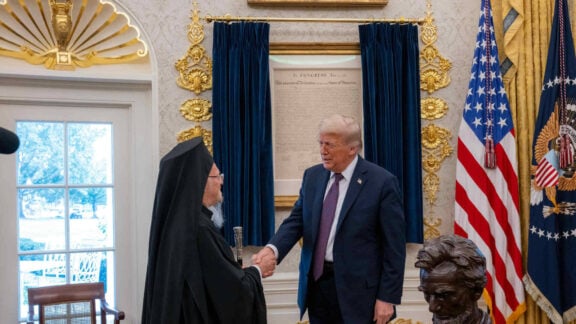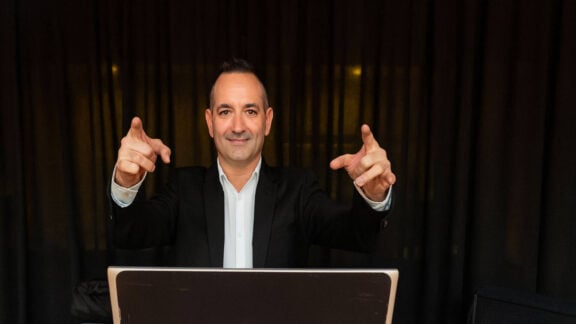Thousands gathered around Hagia Sophia on Friday morning for prayers at the museum-turned-mosque for the first time in 83 years, however only 500 were allowed to enter the church due to COVID-19 measures.
Turkey’s Director of Religious Affair Ali Erbas climbed the psalteria-turned-minbar (mosque pulpit) and gave his sermon in the church with the covered mosaics using a sword.
Symbolism matters: #Turkey gov't top Imam uses Ottoman sword ⚔️to climb up the staircase of Minbar (pulpit) before delivering a sermon for Friday prayer in #HagiaSophia where entire Turkish leadership is present.
Sword represents the conquest for #Erdogan's neo-Ottoman dreams. pic.twitter.com/yh3qMd8cL2
— Abdullah Bozkurt (@abdbozkurt) July 24, 2020
Turkish President Recep Tayyip Erdogan, wearing a face mask for protection against coronavirus, recited the Quran. He also made a short statement before heading to the tomb of Sultan Mehmed II, who conquered Istanbul from the Byzantines on 29 May, 1953.
“After the judiciary saw the truth, this place has returned to what it originally was. Now, it will serve all the believers as a mosque again. Also, it is a place that people from all religions can come and visit as a cultural heritage of humanity. Now, let’s visit the grave of Sultan Mehmed the Conqueror, the real owner of this,” he said, citing official figures that there were more than 350,000 people present around the building.
https://twitter.com/istanbulism/status/1286650321222148097
As prayers were happening inside Hagia Sophia, Turkish authorities closed off the mausoleum of Mustafa Kemal Ataturk, the father of modern-day Turkey, as well as other monuments honouring him on Friday. Non-government organisations were barred from celebrating the 97th anniversary of the signing of the Treaty of Lausanne (24 July, 1923) which defined the borders of modern Turkey. In the past, Mr Erdogan had criticised the signing of the Treaty.
Ataturk. a Turkish national hero, had orchestrated a secular Turkey and had given the decree to convert the Byzantine cathedral from a mosque to a museum.
READ MORE: Hagia Sophia’s conversion to a mosque is as much an affront to Kemal as it is to Christianity
US response
US President Donald Trump and Vice President Mike Pence met at the White House with Archbishop Elpidophoros of America.
“I communicated our grave dismay at the re-conversion of Hagia Sophia into a mosque, as well as ongoing security concerns for the Ecumenical Patriarchate and issues of religious liberty,” he said on social media.
As I told Archbishop @Elpidophoros today, America will stand firm with the Greek Orthodox Church in the call for Hagia Sophia to remain accessible as a source of inspiration and reflection for every person of every faith. pic.twitter.com/OsuMMuXqBC
— Mike Pence (@Mike_Pence) July 23, 2020
Within Turkey the conversion of Hagia Sophia enjoys greater support than opposition, however international criticism has been plentiful. The EU, UN and US have all condemned the conversion, and leaders of the Roman Catholic Church have joined the Greek and Russian Orthodox churches in condemning the move.
On the day of the re-conversion of #HagiaSophia into a mosque, we mourn not only for ourselves, but for the whole world whose loss this is. We mourn for all people of every faith and every conscience, violated by this forced conversion. pic.twitter.com/S5bay7N5VP
— Elpidophoros (@Elpidophoros) July 24, 2020
Originally built in the Roman Empire, the Hagia Sophia was rebuilt in its current form in the sixth century as an Orthodox cathedral. The Ottoman Empire converted it into a mosque in the 15th century.






